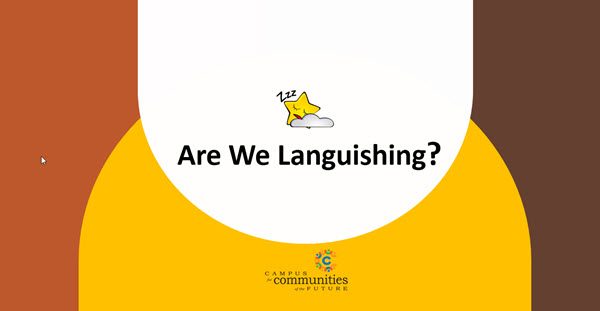Are We Languishing?

Recently, a talented group of consulting colleagues met in a relaxed, informal networking setting. During the gathering a lot of ground was covered as both personal and work-related subjects were addressed. More than once, there was discussion about broken systems and how they too often constrain and limit innovative responses to individual, social, economic, and environmental well-being.
There was also acknowledgement of vetocracy: a term typically used in government and traditional institutions to describe the system of entrenched interests that make it very hard to get anything radical built or done.
During the meeting health care, global warming, education, the economy, poverty, housing, and inequity were top of mind. It was also observed that some of those working within the systems appeared to have surrendered and were simply doing the best they could in a collective kind of languishing - a term first used by Corey Keyes to describe feeling lackluster or disconnected - the opposite of flourishing.
Thoughts of fixing the systems were described as being deflected for reasons varying from (1) thinking it would add more to their workloads and (2) not accepting it was their responsibility to fix. Even when desirous of change many (3) did not know how, or where, to begin.
One colleague who was dealing with a critically ill family member described his experience with systems in this way, ‘The individuals were wonderful, but the systems – meaning leadership, regulations, policies, and funding – often stifled their ability to respond in the most ideal way and do what they felt was the right thing to do’.

During the conversation, an example was shared pertaining to a local health network. Designed to integrate and simplify access to community care, the organization refused to communicate with their clients via email or text, insisting instead on phone, fax, or in-person meetings exclusively. To no one’s surprise, this created frustration as well as long waiting periods.
No one in the group was able to justify or support that as being the ‘right thing to do’ in today’s digitized, busy, complex world.
Everyone in the conversation agreed there were many good people working in government, social purpose organizations, and business. Unfortunately, too often they seemed trapped in bad systems. Examples of these systems include those for controlling finances, human resources, purchasing, and communication particularly with stakeholders.
While everyone in the group was exceedingly polite, there were differences of opinions in terms of how and why their systems were broken. Some argued the systems shouldn’t be described as broken because the systems were doing what they were designed to do a century ago. As a result they simply were no longer relevant.
Peter Senge, a proponent of systems thinking, suggests that when we perceive a system as broken, it is not truly broken but rather behaving according to its inherent characteristics.
There was also discussion about which sector was best positioned to provide the fixes that were urgently needed to address the inter-relatedness of an increasing number of complex and challenging issues and opportunities.
Similar conversations to this have been occurring at community meetings for years. “Our systems are broken” has been a common refrain. Yet, for most, there have been few, if any, opportunities to step outside one’s respective organization, silo, or sector to determine what could, and should, be done differently.
Fortunately some incredible community leaders from across Canada have provided a better understanding of what can be done differently to address complex issues and opportunities and move beyond broken systems
*************************************
Interested in learning more about what can be done in your community to amplify social, economic, and environmental well-being?
Watch this free 8 minute video for a sneak peak of 10 Key Learnings. free 8 minute video.
If the learnings shared in the video resonate, you may want to dig deeper by exploring our learning options for practical, impactful solutions and how-tos designed to accommodate your budget and your learning preferences - priced from $99 to $850.
Posted on 02-26-24Next entry: The Role of Sector-Connectors: Utilizing Collective Wisdom for Whole-Community Development
Previous entry: Doin’ What Comes Naturally?

 Brenda Herchmer is the owner of Grassroots Enterprises, a community development consulting company.
Brenda Herchmer is the owner of Grassroots Enterprises, a community development consulting company.